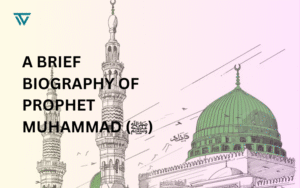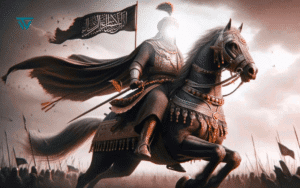Story of Musa (AS): The Quranic Narrative

0 people are currently reading this article
Prophet Musa (Moses) (AS), stands as one of Islam’s most revered messengers. His life was an epic saga of trials, faith, and leadership. The Holy Quran mentions the Story of Musa (AS) more than any other prophet, making it a profound source of guidance. God chose him to liberate the Bani Isra’il (بني إسرائيل) from Pharaoh’s tyranny and deliver the sacred law, the Torah.
The Miraculous Birth: A Pivotal Chapter in the Story of Musa (AS)
In ancient Egypt, the ruler held the title of Pharaoh. The Pharaoh of that time was arrogant and cruel, even declaring himself a god. One night, a terrifying dream haunted him. He saw a fire from Jerusalem sweep through his kingdom, burning his people but sparing the Bani Isra’il (بني إسرائيل).
Troubled, he summoned his advisors. They claimed the dream meant an Bani Israelite boy would be born to destroy his empire. Fear and paranoia drove Pharaoh to issue a cruel decree: kill every newborn Bani Israelite son.
Into this world of terror, Musa’s mother gave birth to him. She feared deeply for her son’s life. In her despair, God sent her a divine inspiration. The Quran describes this in Surah Al-Qasas, verse 7:
وَأَوْحَيْنَا إِلَىٰ أُمِّ مُوسَىٰ أَنْ أَرْضِعِيهِ ۖ فَإِذَا خِفْتِ عَلَيْهِ فَأَلْقِيهِ فِي الْيَمِّ وَلَا تَخَافِي وَلَا تَحْزَنِي ۖ إِنَّا رَادُّوهُ إِلَيْكِ وَجَاعِلُوهُ مِنَ الْمُرْسَلِينَ
“And We inspired the mother of Musa (Moses), saying, ‘Suckle him; but when you fear for him, cast him into the river and do not fear and do not grieve. Indeed, We will return him to you and will make him [one] of the messengers.’”
(Surah Al-Qasas, 28:7)
Trusting God’s plan, she placed infant Musa (Moses) in a basket on the Nile River. She instructed his sister to follow it from a distance. The basket drifted by divine will directly to Pharaoh’s palace. The guards discovered it and brought it to Pharaoh’s wife, Asiya.
The child’s heavenly beauty filled Asiya’s heart with love. Though Pharaoh ordered the baby killed, Asiya pleaded with him. The Quran recalls her words:
وَقَالَتِ امْرَأَتُ فِرْعَوْنَ قُرَّتُ عَيْنٍ لِّي وَلَكَ ۖ لَا تَقْتُلُوهُ عَسَىٰ أَن يَنفَعَنَا أَوْ نَتَّخِذَهُ وَلَدًا وَهُمْ لَا يَشْعُرُونَ
“And the wife of Pharaoh said, ‘[He will be] a comfort of the eye for me and for you. Do not kill him; perhaps he may benefit us, or we may adopt him as a son.’ And they perceived not.”
(Surah Al-Qasas, 28:9)
Thus, in a supreme act of irony, God planned Musa’s protection and upbringing in the very house of his enemy.
A Royal Upbringing and an Unforeseen Exile
Musa (Moses) (AS) grew up within the luxury of the royal palace. One day, he saw an Egyptian man fighting an Bani Israelite. The Bani Israelite cried out for help. Musa (AS) intervened and struck the oppressor, who unexpectedly died.
He felt immediate regret for this unintentional act and prayed for forgiveness, which God granted.
قَالَ رَبِّ إِنِّي ظَلَمْتُ نَفْسِي فَاغْفِرْ لِي فَغَفَرَ لَهُ ۚ إِنَّهُ هُوَ الْغَفُورُ الرَّحِيمُ
“He said, ‘My Lord, indeed I have wronged myself, so forgive me,’ and He forgave him. Indeed, He is the Forgiving, the Merciful.”
(Surah Al-Qasas, 28:16)
However, news of the incident reached the palace. Pharaoh’s court conspired to execute him. A well-wisher warned him to flee immediately. This act of violence was a critical turning point, propelling the next chapter in the story of Musa (AS). Trusting God, he escaped Egypt and journeyed toward Midian.
Refuge in Midian and a New Beginning
Exhausted and hungry, Musa (Moses) (AS) arrived at a well in Midian. He saw shepherds watering their flocks while two women stood aside, unable to approach. He asked why they were waiting. They explained their father was old, and they had to wait until the men were finished.
Moved by compassion, Musa (AS) single-handedly drew water for their flock. The women returned home early, surprising their father, the Prophet Shuaib (AS). After hearing what happened, he invited Musa (AS) to their home. Shuaib (AS) offered him safety and a proposal. He could marry one of his daughters in exchange for eight years of work, with an option for ten. Musa (AS) agreed.
The Burning Bush and the Call to Prophethood
After completing his service, Musa (AS) started the journey back to Egypt with his family. One cold night near Mount Sinai, he saw a fire in the distance. He told his family to wait. He hoped to get some fire for warmth or find guidance.
As he approached, he witnessed a miracle. A bush was ablaze but not consumed. As he stood in awe, a voice called out from the tree:
فَلَمَّا أَتَاهَا نُودِيَ يَا مُوسَىٰ * إِنِّي أَنَا رَبُّكَ فَاخْلَعْ نَعْلَيْكَ ۖ إِنَّكَ بِالْوَادِ الْمُقَدَّسِ طُوًى * وَأَنَا اخْتَرْتُكَ فَاسْتَمِعْ لِمَا يُوحَىٰ
“But when he came to it, he was called, ‘O Musa, Indeed, I am your Lord, so remove your sandals; indeed, you are in the sacred valley of Tuwa. And I have chosen you, so listen to what is revealed.’”
(Surah Taha, 20:11-13)
Here, Musa (AS) received his official call to prophethood. God granted him two powerful miracles for his mission:
- The Staff: It would transform into a massive snake when thrown.
- The Radiant Hand: It would shine with a brilliant, disease-free light when drawn from his cloak.
With these divine signs, the mission central to the story of Musa (AS) was set to begin.
Confrontation with Pharaoh: The Climax in the Story of Musa (AS)
God commanded Musa (AS) and his brother, Aaron (Harun AS), to confront Pharaoh. They were to call him to worship the one God and free the Bani Isra’il (بني إسرائيل). They delivered the message and showed him the miracles. The arrogant Pharaoh dismissed Musa (AS) as a magician. He challenged him to a public duel against his best sorcerers.
On the day of the festival, the magicians cast their ropes and staffs. They created the illusion of a sea of snakes. Then, by God’s command, Musa (AS) threw his staff. It became a real serpent and devoured their illusions. The magicians knew this was a true act of God. They fell in prostration, declaring their new faith. The nine distinct plagues God later sent upon Egypt are a powerful element within the story of Musa (AS), showing the consequences of Pharaoh’s pride.
The Parting of the Sea and the End of a Tyrant
Finally, God instructed Musa (AS) to lead his people out of Egypt at night. Enraged, Pharaoh and his army pursued them. They cornered the Bani Israelites at the edge of the Red Sea. With the sea ahead and the army behind, the people cried out in terror.
Musa (AS) replied with unshakable faith:
قَالَ كَلَّا ۖ إِنَّ مَعِيَ رَبِّي سَيَهْدِينِ
“[Musa] said, ‘No! Indeed, with me is my Lord; He will guide me.’”
(Surah Ash-Shu’ara, 26:62)
At God’s command, Musa (AS) struck the sea with his staff. The water parted, creating twelve dry paths. The Bani Israelites crossed safely. As Pharaoh and his army charged after them, the waters collapsed, drowning the tyrant and his entire force. The parting of the Red Sea is arguably the most breathtaking miracle in the story of Musa (AS).
Mount Sinai: The Defining Trial in the Story of Musa (AS)
After their liberation, God summoned Musa (AS) to Mount Sinai for forty nights to receive the Torah. During this profound communion, he felt an overwhelming desire to see his Lord. The Quran documents this incredible request:
وَلَمَّا جَاءَ مُوسَىٰ لِمِيقَاتِنَا وَكَلَّمَهُ رَبُّهُ قَالَ رَبِّ أَرِنِي أَنظُرْ إِلَيْكَ ۚ قَالَ لَن تَرَانِي وَلَٰكِنِ انظُرْ إِلَى الْجَبَلِ فَإِنِ اسْتَقَرَّ مَكَانَهُ فَسَوْفَ تَرَانِي ۚ فَلَمَّا تَجَلَّىٰ رَبُّهُ لِلْجَبَلِ جَعَلَهُ دَكًّا وَخَرَّ مُوسَىٰ صَعِقًا ۚ فَلَمَّا أَفَاقَ قَالَ سُبْحَانَكَ تُبْتُ إِلَيْكَ وَأَنَا أَوَّلُ الْمُؤْمِنِينَ
“And when Musa came to Our appointed time and his Lord spoke to him, he said, ‘My Lord, show me [Yourself] that I may look at You.’ [Allah] said, ‘You will not see Me, but look at the mountain; if it should remain in its place, then you will see Me.’ But when his Lord appeared to the mountain, He rendered it level, and Musa fell down unconscious. And when he awoke, he said, ‘Exalted are You! I have repented to You, and I am the first of the believers.’”
(Surah Al-A’raf, 7:143)
Following this powerful lesson, God gave him the Tablets of the Law. Before leaving, Musa (AS) had appointed his brother Aaron as leader. However, a man named Samiri led the people astray. He fashioned a golden calf from their ornaments, which made a lowing sound. The people began to worship it. This betrayal marked a tragic turn in the story of Musa (AS). When he returned, he was heartbroken and furious to see his people committing idolatry.
Forty Years in the Wilderness
As a consequence of their disobedience, God decreed the Bani Isra’il (بني إسرائيل) would wander the desert for forty years. Yet, even then, God’s mercy was present. He sent them heavenly food, ‘Manna and Salwa’. He caused twelve springs to gush from a rock when Musa (AS) struck it. The patience and divine providence during these forty years are central lessons from the story of Musa (AS).
Conclusion and Lasting Lessons
The life of Prophet Musa (AS) is a powerful testament to faith, patience, and leadership. His journey teaches timeless lessons: truth prevails over falsehood, arrogance leads to destruction, and God’s plan operates beyond human understanding. Ultimately, the complete story of Musa (AS) serves as a timeless epic of liberation. It shows a path not just from physical slavery, but from the chains of disbelief, inspiring humanity to stand for justice and trust in the divine.




